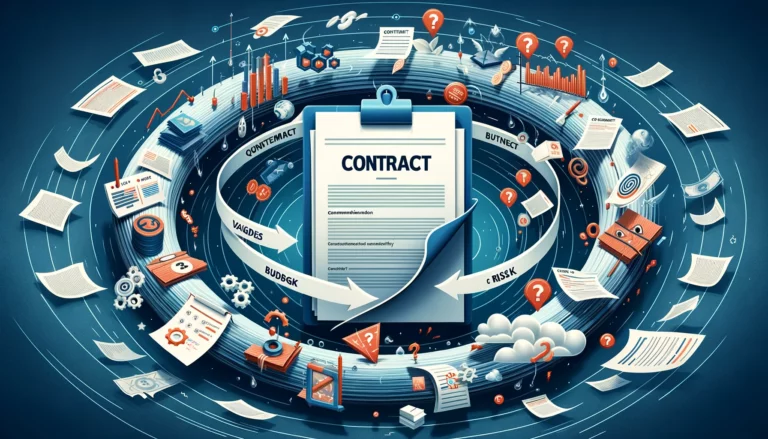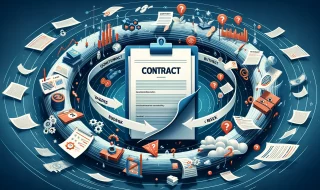In the world of project management, the formulation of contracts is crucial to laying the foundations for effective project planning and control. However, contracts often reveal weaknesses that can create considerable challenges throughout the lifecycle of the project. By studying the five main weaknesses encountered in contracts, it is possible to identify potential pitfalls and the strategies to employ to avoid them, thereby ensuring smoother project execution.
Project Contracts weaknesses: Insufficient Definition of Scope
The scope of work, which describes the project’s objectives, deliverables and deadlines, forms the basis of any contract. Insufficient definition of scope is a common weakness that can lead to misunderstandings and disputes between parties. This ambiguity often leads to scope creep, where additional work is added to the project without any corresponding adjustments in time and cost. The consequences of scope creep are varied, including delays, budget overruns and even compromised project quality.
In short, to mitigate this problem, it is imperative to ensure that the contract includes complete and detailed descriptions of all tasks, deliverables and deadlines. Effective strategies include using precise language, using industry standards to define terms, and incorporating diagrams or models for clarity. In addition, putting in place a robust scope management plan that describes the procedures for managing changes in scope can provide a structured approach to managing changes and preventing scope creep on the project.
Strategies for defining a clear project scope
- Involve all stakeholders
- Develop a detailed project plan
- Incorporate scope management procedures
- Define exclusions
- Review and communicate regularly
Project Contracts weaknesses: Inadequate risk management
Inadequate risk management is another critical weakness of contracts. Projects are inherently risky, with the potential for unforeseen events to affect timescales, costs and results. A contract that does not adequately allocate risk between the parties, or does not identify specific risk management responsibilities, can lead to disputes and project interruptions when problems arise.
Therefore, an effective risk management within contracts involves identifying, assessing and allocating potential risks, as well as defining clear protocols for managing these risks. This requires a proactive approach by all parties to anticipate potential problems and agree risk mitigation mechanisms, including insurance requirements, contingency reserves and specific risk liability clauses.
Strategies for effective risk management in contracts
- Completely identify the risks
- Assess and prioritise the risks
- Assign responsibility for risks
- Develop mitigation strategies
- Review risks regularaly
- Draw up contingency plans
- Set up clear communication channels
Project Contracts weaknesses: Insufficient detail on Change Control Procedures
Changes are inevitable in projects, requiring adjustments to scope, timescales and costs. The lack of clear procedures for controlling changes to a contract is a significant weakness that can lead to delays and conflicts. Without agreed mechanisms for initiating, approving and implementing change, projects can become mired in disputes and inefficiencies.
In other words, contracts should incorporate detailed change control procedures that describe the process for submitting change requests, the mechanisms for review and approval, and the methods for implementing changes. This clarity ensures that all parties have a common understanding of how changes are managed, facilitating smoother project adaptation and reducing the likelihood of disputes.
Set up effective change control strategies
- Define a clear change control process
- Set up a Change Control Committee (CCC)
- Set up a change request system
- Assess the impact of changes
- Communicate changes effectively
- Review and adapt the change control procedures
Project Contracts weaknesses: Vague or unrealistic timelines and deadlines
The success of a project often depends on the realism and clarity of its timelines and deadlines. Contracts with vague or unrealistic schedules are prone to delays and cost overruns because they do not take into account the complexities of the work, the availability of resources and external factors. Such planning puts undue pressure on the parties, which can compromise the quality of the work and the results of the project.
As a result to counteract this weakness, it is essential to put in place realistic schedules, drawn up after a careful assessment of the scope of the project, an analysis of resources and an assessment of the risks. Incorporating milestones and allowing leeway also allows for greater flexibility and anticipation of potential delays, ensuring that deadlines are both feasible and in line with project objectives.
Strategies for setting realistic schedules and deadlines
- In-depth planning
- Realistic time estimates
- Risk management
- Stakeholder engagement
- Methodologies
- Regular monitoring and adjustments
- Clear communication
Project Contracts weaknesses: Lack of Clear Communication and Reporting Requirements
Effective communication and reporting are essential to the successful management of a project, facilitating transparency, timely decision-making and stakeholder engagement. A contract that does not specify the frequency, format and content of progress reports encourages misunderstandings and a lack of awareness of the project’s progress.
Meanwhile in order to consolidate contracts in the face of this shortcoming, it is crucial to put in place explicit communication protocols and precise reporting criteria. This includes determining the types of reports, their frequency and the channels of communication, ensuring that all parties are continually aware and able to respond proactively to project developments.
Strategies for effective communication and reporting
- Communication channels and protocols
- Reporting requirements
- Stakeholder engagement
- Change management
- Conflict resolution
- Privacy and data protection
- Compliance and regulatory requirements
Conclusions
Managing a portfolio of multiple projects is a complex challenge for organisations seeking to achieve their strategic objectives. Although this approach offers centralisation of projects and optimisation of resources, it requires a high degree of adaptability to overcome the inherent challenges.
Implementing these solutions requires a combination of good project management practices, the use of appropriate technological tools, and an organisational culture focused on collaboration and adaptability. By addressing these challenges, organisations can turn the complexity of multiple project portfolios into an opportunity for continuous improvement and organisational success. Proactive, integrated management of these aspects will optimise operational efficiency and ensure the successful achievement of the objectives set by the company.
Choosing PROPRISM to ensure controls of your projects
PROPRISM deploys its expertise in Project Controls to offer you solutions tailored to the management and control of your projects. We have a team of experts capable of improving the quality of your projects, promoting productivity and strategic alignment, as well as reducing costs and ensuring deadlines. PROPRISM operates in the pharmaceutical, marine, construction, engineering, transport and infrastructure, and chemical industries.
Our experts play a key role in the success of your projects. Their experience is employed to ensure that resources are properly allocated and that budget forecasts are adhered to. Using agile methods and project management tools that encourage adaptability and responsiveness to change, they encourage improvement and productivity in project management. PROPRISM also plays an essential role in providing advice and assistance, and supports your teams throughout the project life cycle with ongoing training. We also ensure coordination and motivation throughout the project to guarantee its success. Thanks to our solid expertise and essential teamwork, we can work with you to make your projects successful.




